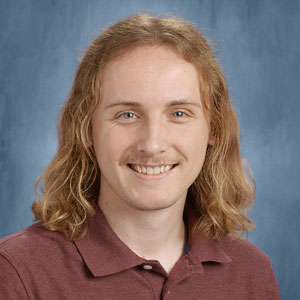
Reflection by Ethan Tylski, UCARE Student and Intern
Read at the NE Stories of Humanities Launch Event at the Nebraska Union, April 26, 2022:
Hi everyone, my name is Ethan Tylski. I am a senior secondary social science education major and I have had the privilege of working on and off with Beth for the past few years.
It has been an absolute privilege, truly one of the highlights of my college career to be able to participate in this project during these last two difficult years of Covid. If you’ll humor me for a second, I want to talk a little literature. One of my favorite books has always been A Tale of Two Cities. I think about that book a lot, especially its opening line: “It was the best of times, it was the worst of times.” I’m sure you are all familiar with that particular line. In a lot of ways, I think that quote can apply to many eras, including our own, but I want to say something about WWII and the Holocaust and the generation that witnessed them both.
The generation that grew up during the Great Depression and fought during WWII are often remembered as the “greatest generation.” I am sure that I am not the only one who sees the irony that the “greatest” generation lived during a time of human atrocity and suffering. They saw the “worst” of humanity. There are many traits, however, in the Greatest Generation, that earn them that title. Conviction, integrity, humility, and faithful commitment to one’s family and friends.
The primary focus of my own research was on Clarence Williams, an exemplary figure, a local hero no less, who embodied all of these traits. Clarence was a combat medic in the 122nd Medical Battalion of the famous 42nd “Rainbow Division”. Williams was deployed in January of 1945 and participated in the liberation of Dachau in April of that year. I had the honor of reading, transcribing, and encoding hundreds of Clarence’s letters. One of my big takeaways from that entire experience was that Clarence was a great man, living in the worst of times.
Stuck in my bedroom for the first few months of the pandemic, Clarence and I had a lot of alone time. Although Clarence never knew me, I often felt that we were having a conversation. The words that he wrote often stuck with me for days, or even weeks. There were parallels between what was going on in his life and my own. He missed his family, he grieved the loss of human life, he wanted to see a better world. Over time I discovered that Clarence and I weren’t so different. Although writing 80 years ago, I found that we shared many interests. Clarence was an avid photographer and extensively documented the course of the war. I also love photography. Clarence loved a game of cards. I also love cards, but he never won very often and neither do I. But Clarence, more than anything else, loved his wife Gretchen and wrote to her nearly every day. He missed her dearly. I also miss my partner sometimes, but obviously the circumstances are quite different. I live 10 miles away from my partner, he was 5,000 miles away.
His letters to her often consisted of his day-to-day frustrations, often he was concerned about what type of snack she should send him through V-Mail. Although embroiled in the chaos of war, he never forgot his family. He often asked about them and wanted to hear from them. And he proudly carried a photo of Gretchen and bragged to everyone in his battalion. I can also relate to that. I mention all of these moments because Clarence’s story exemplifies the focus of this project. His is a story of humanity.
It may seem like an obvious thing to state, but people living 80 years ago were just as human and alive as we are today. They experienced love, anger, and confusion just as much as we do.
I hope you all get the chance to comb through Clarence’s letters. I am positive that they will impact you as much as they have me. In particular, his letter to Gretchen after liberating Dachau. It is visceral. His words are seared into my memory. By reading his letters, you too become a witness of human atrocity and engage in the most human of acts, empathy. It is my belief that studying history is, in fact, an act of human empathy. By understanding the life of others, we come to better understand our own life. That is why this project is so important and the results of this research are so invaluable. Clarence Williams was a great man, living in the worst of times. We can all learn from him. Thank you all.
Ethan’s transcription work sparked the writing of “Not Too Far Distant,” a performance written by Becky Boesen, commissioned by Nebraska State Historical Society and produced by Blixt Arts Lab. It has received generous grant funding to travel the production throughout the state of Nebraska.







